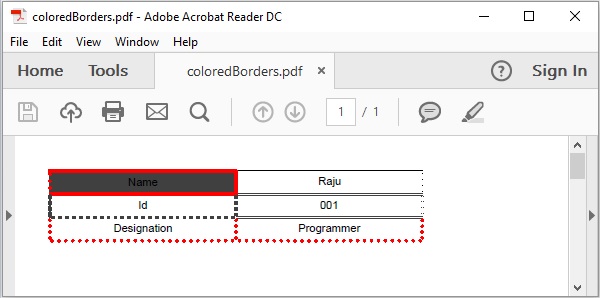- iText-格式化单元格内容
- iText-格式化单元格内容(1)
- iText-设置字体
- iText-设置字体(1)
- 删除单元格边框 css - Html (1)
- 删除单元格边框 css - Html 代码示例
- iText-设置图像的位置
- iText-设置图像的位置(1)
- iText-添加表
- iText-添加表(1)
- 单元格 (1)
- iText-编程示例(1)
- iText-编程示例
- iText教程
- iText教程(1)
- iText-绘制圆
- iText-绘制圆(1)
- 讨论iText(1)
- 讨论iText
- iText-添加列表
- iText-添加列表(1)
- iText-概述
- iText-概述(1)
- iText-圆注释(1)
- iText-线注释
- iText-线注释(1)
- iText-圆注释
- iText-嵌套表
- iText-嵌套表(1)
📅 最后修改于: 2020-10-16 02:50:01 🧑 作者: Mango
在本章中,我们将看到如何使用iText库设置表格中单元格的边框格式。
格式化单元格的边框
您可以通过实例化Document类来创建一个空的PDF Document。在实例化此类时,您需要将PdfDocument对象作为参数传递给其构造函数。
然后,要将表添加到文档中,您需要实例化Table类,并使用add()方法将此对象添加到文档中。
您可以使用Cell类的setBorder()方法添加各种颜色的边框,例如DashedBorder,SolidBorder,DottedBorder,DoubleBorder,RoundDotsBorder等。
以下是格式化表格中单元格边框的步骤。
步骤1:创建一个PdfWriter对象
PdfWriter类表示PDF的DocWriter。此类属于包com.itextpdf.kernel.pdf 。此类的构造函数接受一个字符串,该字符串表示要在其中创建PDF的文件的路径。
实例化PdfWriter类,方法是将一个字符串值(代表您需要在其中创建PDF的路径)传递给它的构造函数,如下所示。
// Creating a PdfWriter
String dest = "C:/itextExamples/coloredBorders.pdf";
PdfWriter writer = new PdfWriter(dest);
当将此类型的对象传递到PdfDocument(类)时,添加到此文档的每个元素都将被写入指定的文件。
步骤2:创建一个PdfDocument对象
PdfDocument类是表示iText中PDFDocument的类。此类属于包com.itextpdf.kernel.pdf 。要实例化此类(以编写模式),您需要将PdfWriter类的对象传递给其构造函数。
通过将上面创建的PdfWriter对象传递给其构造函数来实例化PdfDocument类,如下所示。
// Creating a PdfDocument
PdfDocument pdfDoc = new PdfDocument(writer);
创建PdfDocument对象后,您可以使用其类提供的相应方法添加各种元素,如页面,字体,文件附件和事件处理程序。
步骤3:创建Document对象
包com.itextpdf.layout的Document类是创建自足PDF的根元素。此类的构造函数之一接受PdfDocument类的对象。
通过传递在先前步骤中创建的PdfDocument类的对象来实例化Document类,如下所示。
// Creating a Document
Document document = new Document(pdfDoc);
步骤4:创建表对象
Table类代表一个二维网格,其中填充有按行和列排序的单元。它属于包com.itextpdf.layout.element 。
实例化Table类,如下所示。
// Creating a table
float [] pointColumnWidths = {200F, 200F};
Table table = new Table(pointColumnWidths);
步骤5:建立储存格
通过实例化细胞类的包com.itextpdf.layout.element的添加使用Cell类的add()方法的单元格的内容,如下所示创建一个单元对象。
// Adding cell 1 to the table
Cell cell1 = new Cell(); // Creating a cell
cell1.add("Name"); // Adding content to the cell
步骤6:设置单元格的边框
iText库提供了代表边框的各种类,例如DashedBorder,SolidBorder,DottedBorder,DoubleBorder,RoundDotsBorder等。
这些类的构造函数接受两个参数:代表边框颜色的color对象和代表边框宽度的整数。
选择一种边框类型,并通过传递颜色对象和代表宽度的整数实例化相应的边框,如下所示。
Border b1 = new DashedBorder(Color.RED, 3);
现在,使用单元格类的setBorder()方法设置单元格的边框。此方法接受Border类型的对象作为参数。
通过将上面创建的Border对象作为参数传递给setBorder()方法来设置单元格的边框,如下所示。
c1.setBorder(b1)
最后,要将此单元格添加到表中,请调用Table类的addCell()方法,并将单元格对象作为参数传递给此方法,如下所示。
table.addCell(c1);
步骤7:将表添加到文档
如下所示,使用Document类的add()方法添加在上一步中创建的表对象。
// Adding list to the document
document.add(table);
步骤8:关闭文档
使用Document类的close()方法关闭文档,如下所示。
// Closing the document
document.close();
例
以下Java程序演示了如何使用iText库格式化表格中单元格的边框。它创建一个名为colorBorders.pdf的PDF文档,向其中添加一个表格,格式化其单元格的内容,并将其保存在路径C:/ itextExamples /
将此代码保存在名为FormatedBorders.java的文件中。
import com.itextpdf.kernel.color.Color;
import com.itextpdf.kernel.pdf.PdfDocument;
import com.itextpdf.kernel.pdf.PdfWriter;
import com.itextpdf.layout.Document;
import com.itextpdf.layout.border.Border;
import com.itextpdf.layout.border.DashedBorder;
import com.itextpdf.layout.border.DottedBorder;
import com.itextpdf.layout.border.DoubleBorder;
import com.itextpdf.layout.border.RoundDotsBorder;
import com.itextpdf.layout.border.SolidBorder;
import com.itextpdf.layout.element.Cell;
import com.itextpdf.layout.element.Table;
import com.itextpdf.layout.property.TextAlignment;
public class FormatedBorders {
public static void main(String args[]) throws Exception {
// Creating a PdfWriter object
String dest = "C:/itextExamples/coloredBorders.pdf";
PdfWriter writer = new
PdfWriter(dest);
// Creating a PdfDocument object
PdfDocument pdfDoc = new PdfDocument(writer);
// Creating a Document object
Document doc = new Document(pdfDoc);
// Creating a table
float [] pointColumnWidths = {200F, 200F};
Table table = new Table(pointColumnWidths);
// Adding row 1 to the table
Cell c1 = new Cell();
// Adding the contents of the cell
c1.add("Name");
// Setting the back ground color of the cell
c1.setBackgroundColor(Color.DARK_GRAY);
// Instantiating the Border class
Border b1 = new DashedBorder(Color.RED, 3);
// Setting the border of the cell
c1.setBorder(b1);
// Setting the text alignment
c1.setTextAlignment(TextAlignment.CENTER);
// Adding the cell to the table
table.addCell(c1);
Cell c2 = new Cell();
c2.add("Raju");
c1.setBorder(new SolidBorder(Color.RED, 3));
c2.setTextAlignment(TextAlignment.CENTER);
table.addCell(c2);
// Adding row 2 to the table
Cell c3 = new Cell();
c3.add("Id");
c3.setBorder(new DottedBorder(Color.DARK_GRAY, 3));
c3.setTextAlignment(TextAlignment.CENTER);
table.addCell(c3);
Cell c4 = new Cell();
c4.add("001");
c4.setBorder(new DoubleBorder(Color.DARK_GRAY, 3));
c4.setTextAlignment(TextAlignment.CENTER);
table.addCell(c4);
// Adding row 3 to the table
Cell c5 = new Cell();
c5.add("Designation");
c5.setBorder(new RoundDotsBorder(Color.RED, 3));
c5.setTextAlignment(TextAlignment.CENTER);
table.addCell(c5);
Cell c6 = new Cell();
c6.add("Programmer");
c6.setBorder(new RoundDotsBorder(Color.RED, 3));
c6.setTextAlignment(TextAlignment.CENTER);
table.addCell(c6);
// Adding Table to document
doc.add(table);
// Closing the document
doc.close();
System.out.println("Borders added successfully..");
}
}
使用以下命令从命令提示符处编译并执行保存的Java文件-
javac FormatedBorders.java
java FormatedBorders
执行后,上述程序将创建一个PDF文档,并显示以下消息。
Borders added successfully
如果验证指定的路径,则可以找到创建的PDF文档,如下所示。
